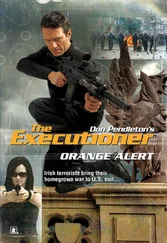They’d come out with Pringles, Combos, sodas, every variety of M&M’s known to man. Anything to keep them blissfully unaware of — what? Coming disaster? Apocalypse?
“Unbe-shighting-lievable,” he mumbled as he stared out at the graying sky, then at the E on the gas gauge.
“What was that?” said Seamus, sitting up.
“Nothing, Father,” said Martin. “Go back to sleep. We’re good.”
“Actually, Father...” he added as he glanced out the window to his right.
“What is it, son?” said Seamus, yawning.
“Father, I was just thinking. We weren’t able to make it upstate, right?”
“I’ll say,” Seamus said, looking around. “We didn’t even make it out of the Boogie Down.”
“Well, look over there,” said Martin, pointing out the window at a stand of high-rises a couple of miles west on the horizon.
“That’s Co-op City,” said Seamus. “What about it?”
“Well, you know how in the tsunami videos from Indonesia a lot of people on the beach didn’t do so hot? But you can see plenty of folks on the roofs of the hotels and what have you doing seemingly okay. What do you say we head over there to those buildings and see if we can’t gain some higher ground?”
“But I thought you said that we still had some gas,” Seamus said.
“Bless me, Father, for I have sinned. The tank is dry, I’m sorry to report. We need to get off this bridge, at any rate. For all we know the wave could be heading toward us right now.”
Seamus turned to the rear of the van.
“Kids, kids! Wake up! Wake up now!”
“What now?” said Eddie with his eyes still closed. “Is the van on fire?”
“No,” said Seamus. “Grab your things. We’re all going for a walk.”
“A walk on the highway?” said Brian.
“In the Bronx?” Juliana joined in.
“Rise and shine, Bennetts. One and all,” said Seamus. “It’s time to abandon ship!”
But the world didn’t end.
The world and the mountain held. We didn’t know how. All we knew was that the echoes of the blast finally dissipated and the shudder slowly subsided in the rock. Miraculously, the mountain and the molecules of our bodies all decided to stay happily together.
“We got it!” came over the radio. “Coming out!”
Twenty minutes after they had gone in, the EOD guys came out of the godforsaken cave in their green astronaut bomb suits. The last guy out was a tight-lipped bomb tech, a short and wiry Italian-looking fortysomething guy with dark, hooded eyes. His buddies helped him take off the tool smock hanging down the center of his chest and pull off his spaceman helmet. His sweat-soaked hair was plastered to his forehead as if he’d just gotten out of the shower.
He put down the red-and-black portable X-ray machine they used to check for booby traps, then rolled onto his back in his eighty-pound suit like a dusty upended turtle. One of his buddies handed him something, and he began expertly rolling a cigarette with his oversize, muscular mechanic’s hands.
His name was First Sergeant Matthew Battista of the 789th Explosive Ordnance Disposal Company. He taught at the EOD school at Eglin Air Force Base, near Destin, Florida, and was said to be the best and most technically proficient and experienced bomb tech in the army and perhaps the world.
“Okay, Mattie, what’s the story? If we all weren’t currently having heart attacks, the suspense would be killing us,” Commander Nate said, handing him a baby wipe.
Mattie wiped at his sweaty face as he lay against the rock, staring up at the cloudless sky. He smoked his cigarette in the corner of his mouth without touching it.
“The blast was from a disposal failure,” he finally said. “We were pulling out pieces of detcord through the ring bolts next to cables in the walls, and something must have screwed up — probably a bad piece of deteriorated cable. It’s the same really old Soviet shit we saw in Iraq. Bad cable coupled with some friction burn is my guess. Only a small piece went off, though. About four feet. Thank God we cut it up beforehand.”
“So you were able to defuse everything else?” said Emily. “Did you find the detonator? Was it on a cell-phone trigger? A mechanical timer?”
“That’s what I can’t figure out,” he said, shaking his head. “It’s all wired up, ready to go. We found this.”
He reached over and took two items out of his smock. He held up a small black box with some wires sticking out of it and a brown plastic device with three buttons on it.
“Is that a garage door opener?” I said, looking at it.
He nodded.
“And the black box is a garage door receiver,” he said. “Seen them before. You press the opener, and it sends a signal to the receiver, just like a cell-phone trigger. The whole daisy chain in there was wired up to this receiver except for one crucial detail. The receiver also has to be wired up to a battery in order for it to set off the detcord. There was no battery. Also, there was no battery for the opener, either.”
“So there was no way to set it off,” Emily said.
Battista shook his head.
“They left out the final piece. Makes sense in terms of safety. I wouldn’t want any juice within twenty square miles of this much explosive. Much safer to bring the final pieces together right when you want to blow it.”
“So what do you think, Mike? Rezende had the batteries on him?” Emily said. “Remember how he insisted on hitting his house and throwing on his hiking boots before getting on the bird? The first thing we need to do is retrieve Rezende’s body and begin scouring his records. He didn’t do this by himself.”
“No, that’s the second thing we do,” I said, taking out the satellite phone. “First we call New York City and cancel the evacuation.”
Thirty-eight nautical miles due north of Árvore Preta, back at Amilcar Cabral International Airport on Sal, the first-class passengers on a flight from Munich had cleared customs and were entering the main terminal.
The terminal was very modern — clean and bright, with white walls and polished glass and floors. The in-flight magazine had said its recent remodel was evidence of Cape Verde’s growing appeal to vacationing Europeans looking for an exotic tropical experience.
As he walked, Mr. Beckett remembered what the place looked like in the early ’70s, when he arrived on his first field assignment during the rebellion. The Portuguese military helicopters behind sandbags out on the tarmac; the bullet holes in the barred windows; the nervous-looking troops and press. It had been an exotic experience then as well.
“Gorgeous day. Truly breathtaking,” Mr. Joyce commented, staring at the shining squeaky-cleanness of the glass terminal.
They were both dressed casually now, Eurosporty, with tailored sport coats over Adidas tops, expensive jeans, and Chanel aviator sunglasses.
“Indeed,” said Mr. Beckett as he pulled his rolling Gucci suitcase around a group of Africans and Western travelers sleeping and reading magazines in a row of pleather airport seats. He gazed up at the beams of light spilling down from one of the many overhead skylights.
“One might even call it a momentous day,” he said.
They laughed together as they walked. Then Mr. Beckett yawned. He hadn’t been able to sleep on the flight. Then he smiled again as he took a deep breath.
That was okay. He felt a second wind coming. One last sprint left for the final mile.
“Where is Katarina?” Mr. Joyce said as they approached the airport exit. “I specifically told her to be waiting for us up ahead, at the car-for-hire. I don’t like this.”
Читать дальше












